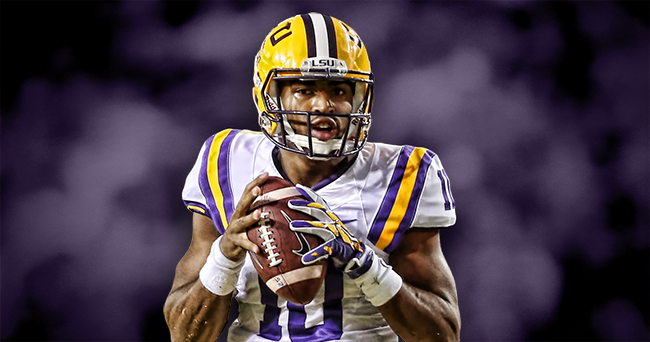Anthony Jennings is both mediocre and clutch
An improbable star made sure LSU earned a probable result for the Tigers in last year’s regular-season finale.
True freshman Anthony Jennings, who entered the game due to injury, connected with Travin Dural for his first career touchdown pass, a 49-yard strike with just more than one minute to go, giving LSU a 31-27 win against Arkansas.
On Nov. 29, 2013, LSU starting quarterback Zach Mettenberger went down with a torn ACL, ending his career with the Tigers. With LSU down 27-21, Jennings came into the game. What came next is a microcosm of Jennings’ career to date.
Entering the game mid-drive about halfway through the fourth quarter, LSU stalled out under Jennings and settled for a field goal, bringing the score to 27-24. After a stop by the Tigers, Arkansas punted and pinned LSU at their own 1-yard line.
“I said, ‘Let’s go. It’s time to go 99 yards,'” Jennings said to reporters after the game. “There was no doubt in my mind we were going to do that.”
That’s exactly what LSU did. Jennings accounted for all of LSU’s yards on the game-winning drive, running for 23 yards and going 4-for-6 passing, including the final touchdown.
Now nine starts into his career, Jennings has been a polarizing figure for Tigers fans. He’s 8-1 in those starts, and any coach will tell you that the won-loss record is all that matters. That begs the question: how does LSU manage to keep winning with Jennings under center?
On the surface, it has nothing to do with Jennings’ prowess as a quarterback. For his career, Jennings is completing 49 percent of his passes, with 9 touchdowns and 6 interceptions. In most circumstances, a completion percentage that low is unacceptable. Yet to the frustration of many LSU fans, Les Miles continues to run Jennings out there week after week, three-and-out after three-and-out.
Despite his apparent ineptitude, half of Jennings’ career wins to this point are of the comeback variety. Against Ole Miss on Saturday, Jennings was at the helm for a 13-play, 95-yard drive in the fourth quarter. While the sophomore quarterback handed off on the first 12 of those plays, he was up to the task when Miles and Cam Cameron dialed up a pass play. Jennings executed a perfect play-action fake, ran a bootleg to his right and lofted a perfect ball to tight end Logan Stokes for a 10-7 lead the Tigers wouldn’t relinquish.
Jennings is completing an even 50 percent of his passes this season. It’s not like he morphs into Peyton Manning in fourth quarters, either. That 50 percent completion rate holds steady in fourth quarters of the three comeback wins Jennings has led this season, as he’s gone 8-for-16 for 158 yards (9.8 yards per attempt), 3 touchdowns and 1 interception. The yards-per-attempt figure is 1.5 yards higher than his mark for the season, but it’s buoyed by a few long passes: a crucial 41-yard strike to Dural against Florida, a 35-yard touchdown to John Diarse against Wisconsin.
The cliche of a player having “it,” some intangible factor that allows a player to step up his game when his team needs it most, does not apply to Jennings. He’s shown himself to be a game manager, a caretaker for a running game that’s evolving into a more dominant unit by the week. The offense has sputtered, at times for long stretches under Jennings, prompting fans to call (and loudly chant) for freshman Brandon Harris.
They got their wish against Sam Houston State, a game in which Jennings looked completely lost before being lifted for Harris midway through the second quarter. Harris lit it up, leading seven straight touchdown drives and earning a start the next week against Auburn. In that game, a 41-7 debacle, Harris flopped harder than Jennings had at any point during the season. Jennings has taken every meaningful snap since coming into the Auburn game in relief.
Despite Jennings’ inability to much in the way of the spectacular, an ability Harris has in spades — see the near-comeback against Mississippi State, when Harris came in an sparked an offense that looked inept with Jennings under center — he seems to come up with his best throws late, even if half of them fall incomplete. He made two clutch throws, the third-and-25 conversion and subsequent end zone fade to Dural, against Florida were impeccable, he had the poise to execute a flawless fake and accurate toss to Stokes against Ole Miss.
Jennings has plenty to improve on. He relies far too heavily on Dural, his instincts as a runner are not quite there and his decision-making ability still leaves something to be desired, according to Miles. If the LSU defense and rushing attack can keep the Tigers in games, maybe it won’t matter if Jennings doesn’t get better.
It’s better to be clutch than good, right?

